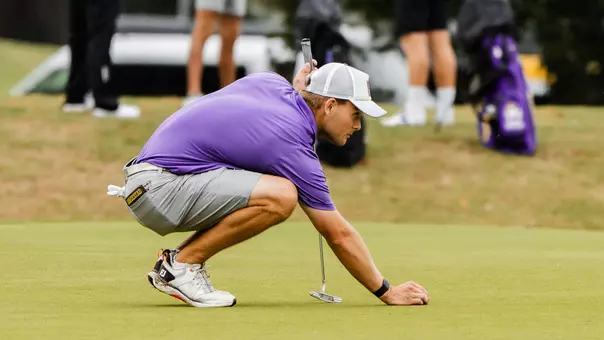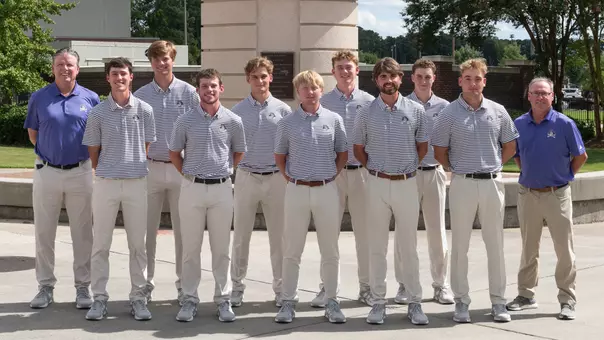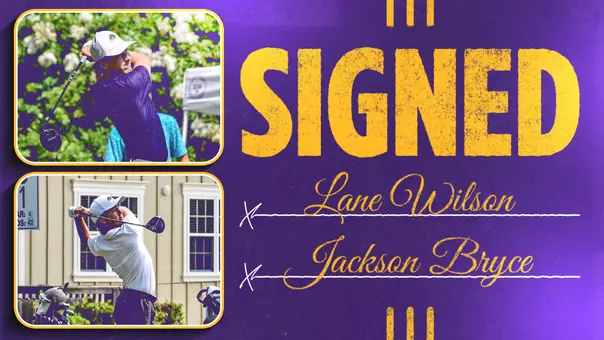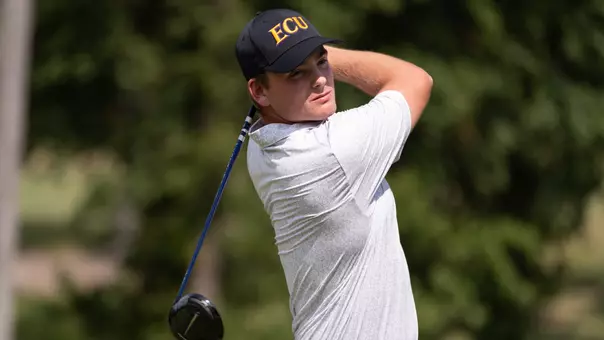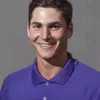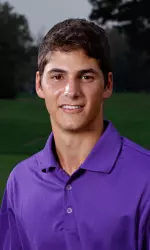
Eibner Playing Through Hazards On And Off The Golf Course
March 13, 2012 | Men's Golf
March 13, 2012
By Sam Hickman, ECUPirates.com
East Carolina men's golfer Ryan Eibner embraces competition.
Dating back to his time as a youngster in Cary, N.C., Eibner had no choice.
Eibner, the youngest of three boys, followed his father and two elder siblings to the baseball field and golf course at every opportunity. He viewed brothers Drew (oldest) and Brett as role models.
If Drew went to the putting green, Ryan was hot on his trail.
If Brett ventured to the park, there was Ryan.
Although the Eibner boys formed an impenetrable bond that endures today, Ryan said the rivalries were heated.
"I'm the baby of the family," he said. "I always wanted to be like them. They were my best friends, but it wasn't always nice. Drew tried to beat all of us, Brett tried to beat him and I tried to out-do both of them. It got ugly at times."
Seemingly, the fiery, win-at-all-cost mentality was a catalyst for the brothers' post-high school careers.
Drew finished his senior year at Green Hope High School in Cary before the family moved to The Woodlands, Texas, a few months later. He returned to North Carolina and continued his career on the links at Appalachian State, but after Eibner's initial campaign as a Mountaineer, his former high school coach, David Allen, accepted a job on the staff at Arkansas. Drew left Boone and followed his prep mentor to Fayetteville, where he finished his collegiate career as a Razorback.
As a teenager, Brett relegated the golf bag to a garage corner and focused solely on baseball. He capped a stellar four-year stint on the diamond at The Woodlands High School by inking a letter-of-intent to play ball for Arkansas. Brett was selected in the 2007 Major League Baseball Amateur Draft by the Houston Astros (fourth round), but chose to join Drew on the Fayetteville campus.
He enjoyed a highly-decorated three-year stint in the Razorbacks' outfield, which included a memorable game-tying, two-out home run against No. 6 Virginia in the 2009 College World Series. Subsequently, the heralded prospect was picked by the Kansas City Royals in the second round of the 2010 draft. He recently concluded his first year of professional baseball as a member of the Class A Kane County Cougars in Geneva, Illinois.
Ryan elected to mirror Drew's path, shifting his attention to fairways, bunkers and greens. However, as the youngest Eibner found himself nearing graduation at The Woodlands, his options for extending his career on the course appeared limited.
"I was barely recruited at all," he said. "I was looking at two, maybe three schools, but mostly Stephen F. Austin. It seemed like that's where I would end up for a while, but Coach (David) Allen knew East Carolina's coach (Press McPhaul). Coach Allen asked if I'd be interested in playing at ECU and I told him `yes.'"
After reaching McPhaul, Eibner said that the Pirates' coach wanted to see him play in person. He flew from Texas to North Carolina during Christmas break in 2008 and his skills impressed McPhaul, who is currently in his sixth year of leadership.
Ryan earned a position on the East Carolina roster and enrolled in 2009.
Despite having played countless rounds against Texas' top prep golfers while struggling to find a school that deemed his game worthy of consideration, Eibner's toughest opponent came away from the course.
A 190-yard approach shot to a tucked pin on a crowned green pales in comparison to the daily challenges a college student with dyslexia endures - a student like Ryan Eibner.
According to the National Institute of Neurological Disorders website, "dyslexia is a brain-based type of learning disability that specifically impairs a person's ability to read. These individuals typically read at levels significantly lower than expected despite having normal intelligence. Although the disorder varies from person to person, common characteristics among people with dyslexia are difficulties with phonological processing (the manipulation of sounds), spelling, and/or rapid visual-verbal responding."
Gerri Cox, founder of Coastal Carolinas' Dyslexia, Inc. in eastern North Carolina, has worked with people of all ages who suffer from the disorder.
Cox said that although dyslexia's impact differs from case to case, its effects are similar in severity.
"It is generally accepted that people think on two levels, verbally and non-verbally," she explained. "Verbal thinking is linear and sequential. Those who think on the verbal level think in terms of the sounds of words. This occurs at about the same speed in which we speak. In comparison, non-verbal thinking is highly associative, multi-sensory and multi-dimensional. Dyslexics mainly think in pictures. It is certainly not an intelligence issue, rather a processing one as recent research studies have proven."
She added that one of the biggest challenges a dyslexic faces is his/her ability to deal with the public misconception that it is an intelligence issue. Cox - who has worked with dyslexic collegiate athletes - said that maintaining a positive self-image and developing confidence is "more difficult than any game the individual might play."
However, the complications are monumental when school and sport collide.
"The student has to spend an extraordinary amount of time on school assignments," Cox said. "When he/she combines the daily adversity of a challenging academic environment with rigorous workout routines and practice schedules, it's difficult to find the right balance. It becomes even more strenuous when the individual starts competing for playing time, which is paramount, especially at the D-1 level."
Although dyslexics find themselves standing toe-to-toe with hardship, the disorder can be labeled a gift rather than a disability.
Albert Einstein, Thomas Edison, Walt Disney and Ted Turner struggled with dyslexia. They proceeded to become wildly successful, world-famous innovators in their respective fields.
Several athletes, including former PGA Tour member Bob May and baseball Hall-of-Famer Nolan Ryan, have utilized the visualization techniques acquired during bouts with the complexities to their advantage. These individuals used the perpetual affliction caused by dyslexia to strengthen their capacity to cope with tense situations on the playing field.
In Eibner's case, he was redshirted as a freshman. He said that the collective decision was made based on a desire to adjust academically while not dealing with the pressures of competitive golf. Typically, anxiety reaches new heights when individuals are placed in more challenging settings.
Although his grades reflected his tribulation during his first semester as a Pirate, Eibner wouldn't let it curtail a promising career as an academic and golfer.
"It's tough for me," Eibner said. "It takes me a lot longer to learn things. It's just something I have to deal with. It's not something that you can perfect. I'm still learning how to manage it."
And the tall, slender sophomore is doing just that.
Despite early trials, Eibner responded admirably. He has seen significant academic progress at ECU, which he attributes to patience and belief.
"I have to maintain focus, just like in golf," he said. "My grades have been getting better and that's because I knew I had to put in the work. It's all about maturity and confidence."
From the athletic perspective, he added the redshirt year helped him become a better player.
"I wasn't ready to play at this level when I got here. I always wanted to compete, but I needed the practice to get better at the mental aspect of golf."
Eibner translated the determination he practiced as a student into sessions on the range, but said there is vast room for improvement.
"I think golf is mostly about confidence. If you're confident, you're going to play well. You have to stand over putts and tell yourself you're going to make it. Being mentally strong is the key. If you let your emotions take over, it can get bad. It's something I'm still working on."
While Eibner's grade point average was on the rise, the tallies on his scorecard dropped considerably.
During last year's Outer Banks Intercollegiate - Ryan's initial campaign - the communications major fired a career-low 67 in the first round. He finished the tournament with a 3-under-par 213, which earned him a tie for ninth-place and marked the first time Eibner cracked a top-10 standing as a Pirate.
His play was good enough at the conclusion of the season that McPhaul placed Eibner in the lineup for the Virginia Tech Regional at the NCAA Championships.
East Carolina competed in the Sea Best Seafood Invitational this past January, its first tournament of the calendar year. The field featured four teams that were ranked among the top 40 in collegiate golf - Coastal Carolina, Florida, North Carolina and Liberty. The annual event was played on the pristine PLAYERS Stadium Course at TPC Sawgrass in Ponte Vedra Beach, Florida.
Eibner proved more than capable of walking the fairway alongside the country's best as he carded a 2-over-par 146 (75-71), leaving him tied for fifth and only four shots off the leader's pace with 18 holes left to play.
Despite a final-round 76 that derailed his chances to capture medalist honors, Eibner's breakthrough performance resulted in yet another finish among the field's top 10.
He continued the recent surge with a 13th place finish at the 2012 Seahawk Intercollegiate in February as he shot even par over the final 36 holes to help lead the Pirates to a first-place finish. The last round included a hole-in-one on the Ocean Course at the Country Club of Landfall in Wilmington, N.C.
In ECU's most recent competition - the General Hackler Championships held at the DeBordieu Club in Georgetown, S.C. - Eibner achieved a career-best medalist runner-up honor as the Pirates notched a second-place result. East Carolina finished ahead of four teams ranked ahead of it in the latest Golfstat ratings.
Eibner's remarkable stretch has made the Pirates a force to be reckoned with on the collegiate golf landscape as they have now finished in the top-5 as a squad in each of their eight tournaments this season, including four marks in the top-3.
As for the individual, Eibner will continue to face adversity throughout his time at East Carolina both on and off the golf course. Based on the tales of his persistence thus far, there is every reason to believe he'll overcome similar obstacles in the future.
